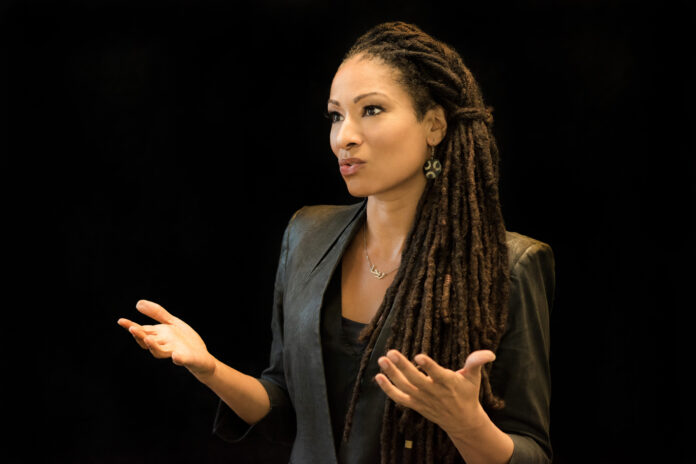
Muhlenberg College is honoring Black History Month by recognizing and bringing awareness to Black activism with this year’s theme “A Love Letter to Black Activism: Celebrating Agents of Change Around the World.” The first event of the month took place on Feb. 16 with keynote speaker Dr. Ruha Benjamin. She is a professor in African American Studies, founder of the Ida B. Wells JUST DATA Lab and is the author of three books. Her talk was centered around her latest book “Viral Justice: How We Grow the World We Want.”
Before the COVID-19 pandemic hit the United States, Benjamin focused on revolutionary research centered on big structural changes regarding race, justice and technology. However, the turmoil from the pandemic and the anti-Black police violence that occurred in 2020 led Benjamin to reflect on the importance of small and individual actions. “Viral Justice” is a personal exploration of how society can be improved just with day-to-day tasks.
Benjamin highlighted that one major thing that we learned from the pandemic is that “something that is undetectable can be deadly and transmitted without us even knowing. Doesn’t this mean that something so small can transform the world around us and have an exponential effect towards justice? This attention to seemingly small actions is what I think of as ‘Viral Justice.’ We can’t wait for top-down change, or those who monopolize power and resources to save us. We have to start right in our own backyards. ‘Grassroots’ can literally mean working in the grass.”
Benjamin then gave examples of viral and transformative justice, or “ways of making things right.” Breonna Taylor tragically lost her life in 2020 due to a brutal forced entry by seven police officers. The “Breonna’s Garden” app was created to commemorate her life. The app contains an augmented reality (AR) where Taylor is surrounded with her loved ones and with things she loves such as tulips and butterflies. Taylor’s family was heavily involved in the creation of the app and it is still a safe space for people to mourn. Users can record messages that can be heard by all of the visitors of the garden, which is an example of how a group of people can have a significant influence. Benjamin said that in Breonna’s Garden, people can “heal, grieve and organize.” The creation of this app has allowed for Taylor to be immortalized.
“We can’t wait for top-down change, or those who monopolize power and resources to save us. We have to start right in our own backyards. ‘Grassroots’ can literally mean working in the grass.”
Ruha Benjamin, Ph.D
Benjamin then segwayed to an incident of viral justice close to her heart and her childhood home in Los Angeles, California. Property owner Frederick Pardee, owner of Corbett and Clemson apartments, passed away. Pardee was a Boston University (BU) alumni and decided to donate the apartments to the university. This meant that BU could evict the 130 residents, who are mostly people of color, if BU sold the apartments to for-profit buyers. However, if BU sold the apartments to the Liberty Community Land Trust, then the tenants could become co-owners of their apartment units. In order to ensure their voices were heard, thousands of people called and emailed BU to voice their concerns for the tenants. In addition, numerous tenant organizations showed up at a rally/press conference at Los Angeles’s City Hall to push for a tenant bill of rights in order for permanent protections to be in place for all tenants of Los Angeles. Benjamin and other professors helped the tenants by drafting up a letter of support and sending it to BU. Many forces combined to make this happen, and it was a bunch of small changes that caused a substantial improvement in the livelihood of these residents. Benjamin reiterated how we must “ask what you can do to be of service. We energize each other.”
Emanuela Kucik Ph.D., faculty fellow for Diversity Equity and Inclusion (DEI) initiatives, and Brooke Vick Ph.D., Chief Diversity Officer, stated that “We chose Dr. Benjamin as our keynote speaker because her work expands our understanding of the concept of activism and reminds all of us that we can be activists in any and all fields. Often, people equate activism solely with protests and marches and the activism they see on the news and in textbooks, but there is no one way to be an activist. Activism is—or should be—part of every axis on which our world turns: education, healthcare, law, art and so much more. Put differently — we can all be activists in our chosen fields, and we can each carry out our activism in unique ways. Through her book, “Viral Justice,” Dr. Benjamin reminds us all of how the seemingly small actions we take in our daily lives can translate into widespread, global change and her work reminds us that we can transform the world through our everyday actions.”
“Often, people equate activism solely with protests and marches and the activism they see on the news and in textbooks, but there is no one way to be an activist.”
Emanuela Kucik, Ph.D and Brooke Vick, Ph.D
An anonymous student stated that she didn’t really know what to expect when walking into this seminar. “I originally only came for the credit for my anthropology class, but I did end up learning that it’s possible for me to be an activist as well. I don’t necessarily have to do something elaborate for reform to occur, even small changes have an impact.”
Des Suarez ‘23 expressed similar thoughts, and said, “I learned that we have the power to make change through the small, daily acts we do—they don’t have to be monumental to cause a ripple effect, it only costs one seed for a garden to grow!”
Claire Spenard ‘23 said, “Benjamin provided so many examples of projects and organizations that do the kind of work that is tangible for anyone to be a part of. Her method of ‘viral justice’ simplifies social justice work rather than complicates it and I left the talk feeling like being a part of the solution was within reach. She also reminded me that life is an embodied experience which sometimes I forget while being suffocated by academia. I don’t need to start projects of my own to be useful, there are people out there doing the work and the most important thing that I can do is find them and help with and uplift their work.”
Shaiyan Feisal '26 is a neuroscience major with a minor in public health. She enjoys writing news and arts & culture pieces to highlight the various voices among the student body and show the variety of commodities Muhlenberg has to offer. When she isn't writing, she enjoys reading murder mystery novels and painting.






















